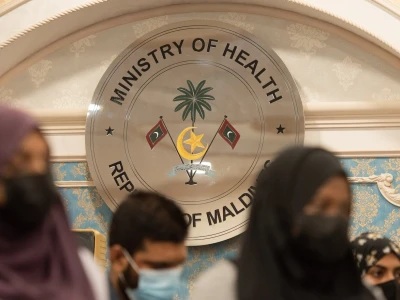
No screening for Filariasis when issuing work permits: Ministry
It takes about 12-8 months for the fungus to multiply in the body and cause symptoms.
Top Stories
By
Ahmed Mizyal
The Ministry of Health has said that Filariasis has not been included in the medical screening for work permits issued to foreigners coming to Maldives.
17 cases of the eradicated Filariasis have been detected in Maldives during a health campaign conducted in Kulhudhuffushi earlier this month to mark World AIDS Day.
Since then, the number of cases in Kulhudhuffushi has risen to 25. But the situation worsened after positive case was reported in Hulhumale on Saturday.
Speaking on PSM's 'Raajje Miadhu' programme, the Director General of Health Services, Dr Ahmed Ashraf said work permits are issued by screening for some diseases. Some of these diseases are:
-
Hepatitis
-
HIV
-
Tuberculosis
“So far, Filariasis screening has not been included in the work permit,” he said.
The senior health ministry official's comments came amid criticism from some on social media that the current cases of Filariasis among foreigners are due to the previous government's suspension of health screening of foreigners during the Covid-19 pandemic.
Screening for additional diseases such as leprosy has been proposed in the past when issuing work permits, but Ashraf said it has not been done yet.
“Now we are discussing how important it is to have this inclusion in the work permit in this way and we are discussing how to identify such cases through the work permit mechanism,” he said.
"The best way is to identify the cases [to identify cases brought into Maldives]. We are currently in discussions on what rules and arrangements we can make in the work permit medical”.
Filariasis is usually spread by the Culex mosquito that lives in dirty water. This is a different mosquito from the Aedes mosquito that spreads chicken pox and dengue.
Filariasis is spread by the infection of the mosquito with a parasitic worm called Wuchereria bancrofti. The fungus lives in the lymph nodes and lymphatic ducts of an infected human body. When a mosquito bites a person with filariasis, the parasites in the person's blood infect the mosquito. The mosquito then transmits the disease to other people.
According to Dr Abdul Aziz Hameed, medical doctor, it takes about 12-8 months for the bacteria to multiply in the body and cause symptoms.
The first symptoms include:
-
Fever; at this stage, there might not be any swelling
-
Chills
-
Headache
-
Vomiting
-
Anxiety
To prevent this disease, it is important to identify and eradicate mosquito breeding grounds.
The last case of filariasis was reported in 2004 in L. Fonadhoo. The survey conducted since 2008 has not found any new cases of filariasis, the Health Ministry said.
A WHO team visited Maldives in 2011 to ensure that filariasis was eradicated. The disease was declared eradicated in Maldives in 2016.




